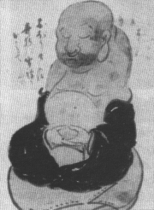Let me start with an unequivocal assertion.
The Zen dharma gave me my life.
I owe this way everything.
And, no doubt, it deserves all the rough handling it has gotten in recent years. (Say, for instance, here, here and here…)
There are numerous issues, ranging from its fundamental assertions about the identity of form and emptiness (I think of no better start on that than the Zensite), the nature of the practices shikantaza and koan introspection, ethical practices, none of which are going to be addressed in this brief reflection.
Rather I’m thinking a lot about authority in Zen. Who leads? And why?
I have two triggers for this. Brad Warner, whom I generally enjoy quite a bit and I feel has a lot worth while to say, holds forth every now and again on how unimportant kensho is. For instance, I believe most recently, in the “addendum” here. I’ve been caught by that opinion on a number of occasions, and not just from Brad. This is pretty much the standard view of the mainstream or “pure” Soto practitioner in the Japanese inheritance.
Brad, and a host of “pure” Soto practitioner’s poo poo kensho.
And, no doubt, at least to my mind, what kensho actually is can be hard to define.
But, as my spiritual ancestor Hakuin Ekaku asserts baldly, “If you don’t have the eye of kensho, it is impossible for you to use a single drop of the Buddha’s wisdom.”
While I think kensho can and is oversold, without that essential insight into the great matter, without that leap beyond self and other, a person isn’t qualified to guide others into the deep way.
(I’m not saying Brad and other pure Soto folk don’t have the eye. I can’t speak directly of Brad, but in my experience no doubt many do. But, I do say it is more than dangerous to court the rhetoric of rejection… It can so easily lead to the blind leading the blind. And I don’t mean blind in the good way…)
That said, the real kickoff point for this reflection was a meditation by my old Dharma buddy Dosho Port, holding forth here.
Dosho’s reflection is actually about titles. Can non celibates, as is generally the case in the Japanese ordination model, be called monks? Or, should they be called priests? Or, something else. Brad tends to like the term monk. Dosho isn’t so comfortable with it. But, he doesn’t particularly like the term that is most common in replacing it, priest, either. Looking at good old Merriam Webster, Dosho doesn’t like the mediator between humans and the gods (or God) usage. I would, respectfully, remind him that the stock in trade of Zen priests in Japan is in fact that, the celebration of ceremonies that create and transfer merit.
Dosho and I were with a bunch of other Zen teachers last month where we heard a talk by the Zen priest and scholar Sogen Victor Hori. Hori opined that in Japanese Soto Dharma transmission has essentially become a mechanism for the transferal of property.
Not awakening.
A lot hangs on that…
Here is what I think.
We have been given a bundle of practices, and a wonderful, if not fully explored moral/ethical framework, that in many very real ways is not dependent upon those who monitor and guide having any particular insight.
Hurrah!
And, guides are good. In tight spots they can be essential…
But, if I were looking for a guide on the Zen way, I would be hard pressed to go with someone who cannot tell what a kensho looks like and what it doesn’t look like.
(Not that Inka is a guarantee, either. See below…)
I think there is indeed a place for Zen monks (and nuns). But that means people who live under rule, probably the most obvious one is celibacy. This is a path of complete devotion to the disciplines for the individual practitioner, and for the world. A hard path. A special calling.
I think there is indeed a place for Zen priests. People who have trained hard and who have a calling to ministry. What exactly that preparation should be is dynamic. But looking at the MDiv isn’t a bad starting point. That, and, of course, of course, lots and lots of zazen.
But, really, the base line has nothing to do with ordination.
To practice Zen is to be a Zen practitioner.
Sit down, shut up, pay attention.
And read some. And meet with a community.
And try to find a spiritual director.
So, here’s the only authority in Zen that I really care about. (Okay, I care about the others, too. But this is the important one. This is the bottom line one…)
Looking for Dharma transmission or Inka is a good start. But, as I’ve pointed out, hardly a guarantee…
But, and this is the hard part, the only authority worth having in a guide on the Zen way is awakening.
A guide on the Zen way must have the eye. May be worthless in many other aspects (boy, do I know), but must, must have the eye.
And, how do you find that person?
Hard, no doubt.
I think some serious koan experience is good in a spiritual director. But, that’s no guarantee, either. Just a good rule of thumb. One or two of the wisest I’ve encountered haven’t much to do with koans. I suspect the old standard for finding anyone to do anything can be good. Ask around. Ask widely.
There are traces around the person who can really guide. Evidences of that insight into the falling away of self and other. Even those who haven’t experienced it, or think they haven’t, often can tell.
When looking, keep your eyes, your ears, and most of all, your heart open.
And, of course, as in all things,
Caveat Emptor…













